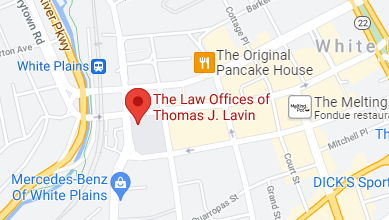Discrimination is a serious issue that affects many across the nation. Whether you are concerned about being treated differently by an employer after filing a worker’s comp claim or you have been offered an unfair settlement amount and believe you may have been discriminated against, Attorney Thomas Lavin explains how discrimination may affect your personal injury claim – and what you can do to fight back.
Can My Employer Discriminate Against Me After a Workers’ Comp Claim?
According to N.Y. Work. Comp. Law § 120, it is unlawful for any employer to fire or “in any other manner discriminate against an employee as to his or her employment because such employee has claimed or attempted to claim compensation from such employer, requested a claim form for injuries received in the course of employment, or claimed or attempted to claim any benefits provided under this chapter or because he or she has testified or is about to testify in a proceeding under this chapter and no other valid reason is shown to exist for such action by the employer.”
While you can be fired for other reasons (such as the employer needs to fill your position because you are unable to work for six months), the law forbids an employer from firing you or discriminating against you just because you filed for worker’s compensation. Employees have up to two years to report the discriminatory incident and any employer deemed to be in violation of section 120 may be fined from $100 to $500 dollars.
Does Discrimination Count as Emotional Distress on a Lawsuit?
Title VII of the Civil Rights Act of 1964 prohibits discrimination prohibits employers from engaging in discriminatory acts in any circumstance of employment – hiring, promoting, firing and any other situations pertaining to an employee. A worker cannot be discriminated against or treated differently based on their race, gender, color, religion, pregnancy or national origin. In addition, as mentioned above, Worker’s Compensation laws prevent employers from discriminating against employees just because they have filed a claim.
Individuals who feel they have been discriminated against by their employers may seek compensation for emotional distress as part of their employer discrimination lawsuit under Title VII. If you decide to take this route, be prepared to support your claim by presenting enough evidence to prove that the discriminatory acts of your employer have caused emotional harm such as depression, anxiety, mental anguish or reputational harm, for example. The evidence required may include medical records and witness testimonies. Title VII limits the amount you may be eligible to recover for emotional damages at $300,000.00, but your personal injury attorney may be able to file suit under a different set of federal, state or local laws that have no settlement cap for emotional damages.
Can My Race And Gender Affect the Size of My Settlement?
Unfortunately, in some instances, injured victims are offered extremely low and inadequate settlement offers. While it is common practice for insurance companies to offer anyone a low settlement in an attempt to quickly dismiss a claim while incurring the lowest cost possible, some personal injury claimants may have reasons to believe their race and/or gender may have played a role in the size of their proposed settlement.
Forensic economists play a major role in determining the amount a personal injury victim may receive. They calculate the potential income a victim could have made if they had not been injured. Historically, women and persons of color have received significantly lower wages than other segments of the population. When a forensic economist relies on those statistics, the result is that an individual may end up receiving less compensation in a personal injury case simply due to the fact of belonging to a minority and based on what they are likely to earn.
What Should I Do If I Believe Discrimination is Affecting My Personal Injury Claim?
If you believe you have been a victim of discrimination either in an employment setting or during the process of receiving a personal injury settlement offer, consider speaking to a skilled discrimination attorney to learn the best course of action for your case. If you are dealing with an insurance company that offered an inadequate settlement amount, the most important thing to be aware of is that you are not obliged to accept their low settlement offer, regardless of what they may say to pressure you into taking their offer.
If you are a victim of any type of workplace discrimination, it is in your best interest to collect as much evidence as possible to prove that you are being discriminated against as well as to document the extent to which the discriminatory acts are affecting you, both economically and emotionally. It may be beneficial to show that you have tried to help yourself and worked with your employer to try and resolve the situation, and sought medical attention to try and remedy the psychological effects of the discrimination, but haven’t been able to reach a positive outcome.
The Law Offices of Thomas Lavin have helped many clients fight back after being discriminated against in New York. We understand how upsetting and overwhelming it might feel to be dealing with discrimination when you are injured or when you are simply trying to earn a living. We have the knowledge and expertise necessary to help bring justice to discrimination victims and to maximize the chances that they will receive a fair, equitable settlement offer for their claim. Contact us for a free consultation to learn your options.










